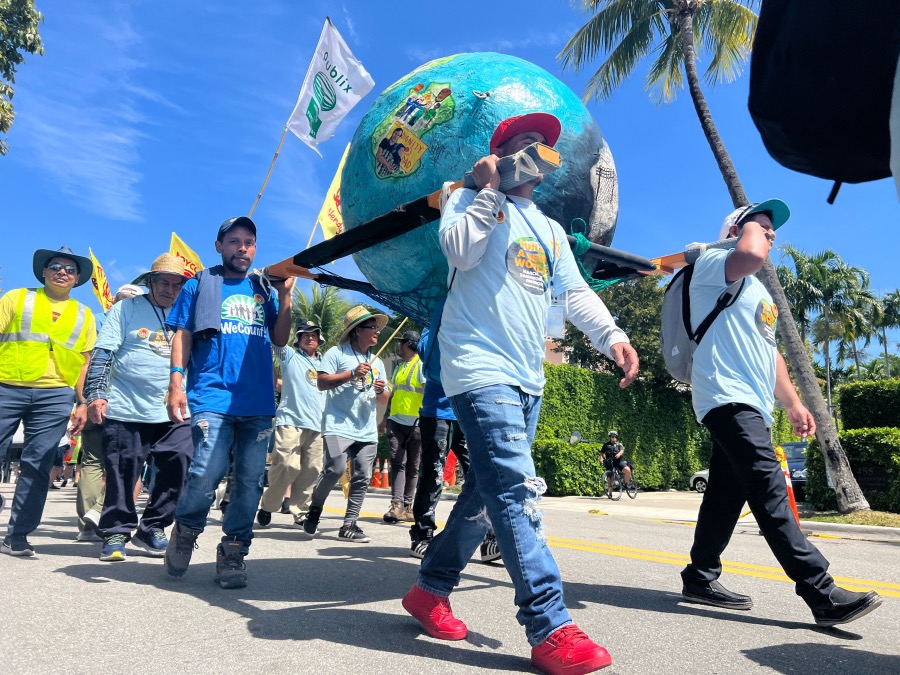WGCU: “Gonzalo… lived in fear of speaking up. But one day, it was just too much. She asked for some water. She was told to drink from the ditch. This is why Lupe Gonzalo marches.”
Palm Beach Post: “According to the coalition, ‘two parallel worlds exist side-by-side within the farming community: the world of freedom from abuse on farms in the program and the world of harsh exploitation outside its protections.'”
The five-day, 50 mile March to Build a New World wrapped up on March 18 with a massive turnout of nearly 600 farmworkers and their allies in Palm Beach, where marchers carried their message of farmworker freedom through the finely manicured streets of the billionaire enclave and home of Wendy’s Chair Nelson Peltz.
Beginning outside a housing complex in the small agricultural community of Pahokee, which served as the labor camp for a sprawling forced labor conspiracy case that the CIW helped to uncover, the five-day march picked up steam on its way to the coast. As marchers celebrated a decade of unparalleled success in human rights protections for the Fair Food Program and demanded Kroger, Wendy’s, and Publix finally join the Presidential Medal-winning program, media from around the nation began to pay attention. From the Associated Press and Fast Company to the Spanish-language Univision and La Jornada, coverage of the march spread quickly throughout the U.S. and beyond.
Today, we wanted to take a moment to highlight a particularly moving piece from PBS and NPR member station, WGCU Public Media. WGCU’s own Eileen Kelley and Andrea Melendez followed us along the way from Day 1 in Pahokee to Day 5 in Palm Beach, documenting this historic march for corporate accountability. On Day 5 they spent time interviewing farmworkers and community members on what the march meant for them personally. Their work was syndicated all around Florida, appearing in radio segments, TV news stations, as well as local news outlets.
Here, below, is an excerpt of their reporting, including a wonderful video as well. You can view their full report here, which also includes a beautiful photo gallery.

They marched to end modern day slavery in the agricultural fields
March 21, 2023 – By Eileen Kelley and Andrea Melendez/WGCU Investigative Team
They came to America in search of a better life. The work in the agricultural fields of Florida they knew would be tough. But it was much worse than that. And so they spoke out during a 50-mile march.
They gathered in Pahokee near an old inn where not too long ago people who looked like them were held captive at night behind locked gates strung with barbed wire.
It was a Tuesday when the crowd of mostly current and former farmworkers marched down the agricultural roads through the belly of Florida.
After 12 miles they stopped. Picking up where they left off the next morning.
As they got closer to the group’s final destination on the island of Palm Beach, the energy grew.
Along the way, the curious had questions, some eager to learn more about the Fair Food Program, a decade-long initiative where major retailers agree to only do business with growers who provide the farmworkers with humane working conditions
Under the agreement the growers must allow a Fair Food worker to come to the farms and camps and inform the workers of their rights. The growers must also allow for routine inspections where workers can freely tell investigators about the working conditions. If the growers won’t adhere to these guidelines, the retailers must agree to take their business elsewhere.
The retailers must also agree to pay an additional one penny per pound for tomatoes they are buying. This money then comes back to the farmworker in the form of a bonus.
A produce truck led the way from rural roads over a bridge surrounded by yachts and mansions. Jimmy Cliff’s upbeat Reggae Song, “You can get it if you really want” plays in the background as a man blars into the a microphone that modern-day slavery still very much exists fields not associated with the fair food program.
His words are a reason they march.
******
Lupe Gonzalo was 20 and far from her home in Guatemala when she learned the promise of a better life in the agricultural fields of Florida was tantamount to a lie.
Rousted from bed around 4 a.m. she’d toil under Florida’s relentless sun picking tomatoes until night fell, arriving back to camp around 8 p.m.
The next morning was same: Grueling work filling one 32-pound bucket of tomatoes after the other without shade breaks or water. She earned about 45 cents for each 32-pound bucket.
Gonzalo did all this, day-in and day-out. She lived in fear of speaking up. But one day, it was just too much. She asked for some water.
She was told to drink from the ditch.
This is why Lupe Gonzalo marches.
*****
A young Gerardo Reyes Chavez dared to speak up, saying the meals the grow operation provided migrant workers were making them ill. Having just arrived from Mexico to pick tomatoes, Reyes asked if he could get $20 to buy some food.
He was fired.
Addressing the crowd along the parade route, he says he will not permit these kinds of abuses any longer.
This is why Gerardo Reyes Chavez marches.
While NPR member radio stations across Florida were buzzing about the March to Build a New World, the Palm Beach Post was busy reporting details on the march’s mission as well. Below is a brief excerpt from the Palm Beach Post, which you can read in full here.

Farmworkers march in Palm Beach, calling for better wages, conditions
March 22, 2023 – Mike Diamond
PALM BEACH — More than 300 farmworkers and supporters marched last weekend through a town with multimillion-dollar homes to call attention to businesses they say are not doing their part to end forced labor on farms.
At Lake Drive Park, where the march began around 11:30 a.m., the contrast was particularly stunning. Farmworkers barely able to earn living wages complained about working conditions on farms where $20 million-plus yachts were docked within hearing distance of their speeches.
One of the reasons for choosing to end the march in Palm Beach was because Wendy’s Board Chairman Nelson Peltz lives there. Wendy’s, Publix and Kroger are among the businesses that have thus far refused to join the Fair Food Program, whose goal is to end worker abuse on farms.
The sponsors of the march, the Coalition of Immokalee Workers, developed the program after finding what they say were far too many cases of abuse, wage theft and sexual harassment.
The coalition has persuaded dozens of businesses such as McDonald’s, Walmart, Trader Joe’s and Subway to participate in the Fair Food Program. The farms associated with them must maintain certain standards to ensure that farm workers are not abused. The Fair Food Program allows workers to complain about working conditions without fear of retaliation…
…According to the coalition, “two parallel worlds exist side-by-side within the farming community: the world of freedom from abuse on farms in the program and the world of harsh exploitation outside its protections.
Keep your eyes peeled for more media roundups and reflections on our five-day trek, and of course, feel free to browse our recaps from each day, including Part One and Two of Day 5’s grand finale!

